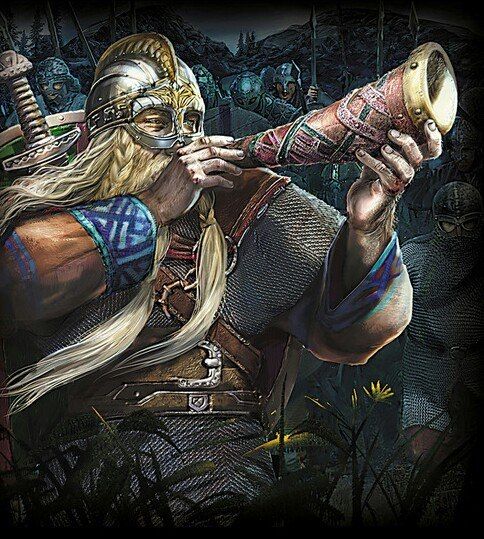The Gjallarhorn: Treasure of God and Sound of Death
No one could deny the fact that treasure like Mjolnir Hammer of Thor or Gungnir Spear of Odin has been gaining so much popularity. Their fame is so great that they overshadow some other less known treasures in Norse mythology. One of such treasures is the Gjallarhorn the Yelling Horn of god Heimdall. No one in Norse mythology loved to hear the sound of this horn, in fact. And the Viking drinking horn is actually the earthly counterpart of the Gjallarhorn of Heimdall.
WHO WAS HEIMDALL?
Heimdall (HEM-doll) was a son of Odin the Allfather, which made him the sibling of gods like Thor, Baldur, Vidar, etc. He was famous for being the guardsman of Asgard. His home rest at the entry of Asgard from which he could observe who were approaching the stronghold of gods.
On a beautiful day when Odin was walking along the seashore, he happened to see nine beautiful maidens. They turned out to be the daughters of Aegir the giant of the sea who was so generous that he often held parties for gods and giant. The nine daughters were gorgeous just like the glittering pearls. Odin with a desire of a man fell in love with all of them on the spot and married nine daughters of Aegir. As your guess, Heimdall was the product of this kind-of-awkward love affair.
He was born and raised by the nine beautiful sea maidens. The beautiful maidens had their own way to raise up their child. Heimdall then became a dazzlingly handsome man with many gifts. We learn that many powerful gods in Norse pantheon were half-god half-giant. Odin and Thor were the golden example and so was Heimdall.

Heimdall was the son of Odin and nine beautiful sea maidens. The Gjallarhorn of Heimdall would sound to alarm the gods when Ragnarok broke
As what was written for Heimdall, he had unique gifts making him a unique guardsman of Asgard. His eyesight was so sharp that he could see anything approaching Asgard from a long distance. His hearing was so acute that he could hear the grass growing up in the land of Midgard. He was also intelligent as many solutions to gods' problems were his wits.
And the most common thing appearing along Heimdall was his Gjallarhorn
GJALLARHORN THE YELLING HORN
Gjallarhorn (GJA-lar-horn) was among the most awesome treasures and weapons of the gods. If Thor never went out without his Mjolnir hammer (unless it was stolen by someone who wished a death sentence by Thor), Heimdall never left his Gjallarhorn at home when he went out. Because the sound of Heimdall's horn meant something was approaching or something was happening whether good or bad.
The reason why the gods did not like the sound of Gjallarhorn was that of its direct connection with Ragnarok Doom of Gods. According to the prophecy, the glory of the gods would end once Ragnarok broke on the sky. During the catastrophe of Ragnarok, the army of giants led by Loki would enter the stronghold of Asgard to wage war. The sound that was set to wake the gods up and pick up their weapons was the sound of Gjallarhorn.
If the fate smiled on the gods in Ragnarok, they had nothing to be afraid. But they were destined to lose and their glory ended because of Ragnarok, the sound of Gjallarhorn was what they didn't want to hear.

The statue of Heimdall sounding the Gjallarhorn in Stockholm
In the Prose Edda, besides being the alarming horn of Heimdall, the Gjallarhorn of Heimdall was the drinking horn of this Asgard guardsman. Using the Gjallarhorn, Heimdall took the wisdom water from the Well of Mirmir and drank. From the drink of the Mimir's water, Heimdall became wise. The scholars discussed that this mythological detail might have inspired the Vikings to drink in their drinking horn which was the only historical horned thing.
The biggest regret is that we have no reliable sources that describe the appearance of the Gjallarhorn. But it seems safe to guess that the horn of Heimdall was no ordinary horn. Being one of the most cherished possessions of the gods, Gjallarhorn must be more uniquely carved than the best horn used among the human.

The Viking drinking horn was believed to be the earthly counterparts of the Gjallarhorn of god Heimdall. The stone depicted the Vikings were feasting and drinking in their drinking horn.




